
The Muslim neighborhood at Kyungpook National University primarily consists of trainees from Pakistan, Nigeria, Bangladesh and other nations with big Muslim populations. Here some members of the neighborhood pray at the Dar ul Emaan Kyungpook Islamic Center, in Daegu, South Korea.
Anthony Kuhn/NPR.
conceal caption
toggle caption
Anthony Kuhn/NPR.

The Muslim neighborhood at Kyungpook National University primarily consists of trainees from Pakistan, Nigeria, Bangladesh and other nations with big Muslim populations. Here some members of the neighborhood pray at the Dar ul Emaan Kyungpook Islamic Center, in Daegu, South Korea.
Anthony Kuhn/NPR.
DAEGU, South Korea– On the best side of a narrow alley, a brand-new mosque is under building. On the left stands a high display screen refrigerator with 3 pig heads within, a definite declaration of opposition to the job.
The otherwise peaceful street in the city of Daegu is the cutting edge of a three-year-long conflict in between Muslim trainees of Kyungpook National University and locals in the community simply outside the school.
These stress are showing to be a test of the country’s tolerance of increasing variety, at a time when South Korea’s leaders are aiming to migration to strengthen the nation’s aging and diminishing labor force.
The Muslim neighborhood at KNU primarily includes trainees from Pakistan, Nigeria, Bangladesh and other nations with big Muslim populations. Its size varies in between 80 and 150 individuals, according to a neighborhood agent. The university’s overall trainee body is practically 27,000.
An area to collect and hope
In 2014, the Muslim trainees raised cash for a location to collect and hope, purchased a home near the university and called it the Dar ul Emaan Kyungpook Islamic Center Your house, simply a couple of minutes’ walk from the west gate of school, was old and too little to accommodate the growing neighborhood, neighborhood members state.

A view of the alley resulting in the Islamic center. Homeowners opposed to a mosque’s building on the website often sit at the entryway to the alley, viewing the location from the yellow camping tent.
Anthony Kuhn/NPR.
conceal caption
toggle caption
Anthony Kuhn/NPR.
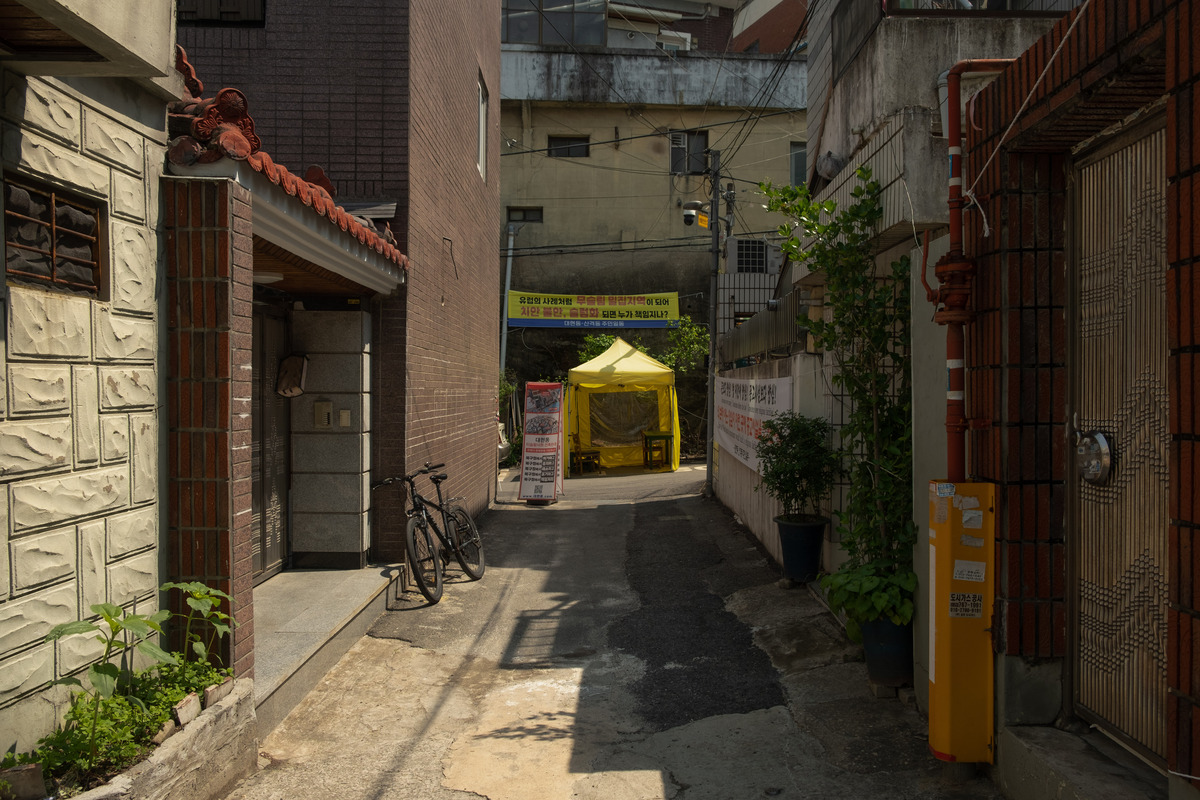
A view of the alley resulting in the Islamic center. Homeowners opposed to a mosque’s building on the website often sit at the entryway to the alley, viewing the location from the yellow camping tent.
Anthony Kuhn/NPR.
So in September 2020, the trainees got approval from the regional district workplace to build a real mosque on the website.
However a couple of months into building, locals near the website submitted a petition to the district workplace, declaring that the structure would turn their community into a “shanty town.” The district workplace right away bought a suspension of the building, pointing out locals’ “mental illness, infraction of home rights and issues about possible shanty towns.”
This captured the Muslim neighborhood off guard. Trainees had actually collected there for prayers 5 times a day for 7 years without any specific dispute with next-door neighbors and did not anticipate their opposition to the brand-new mosque.
The Supreme Court ultimately annulled the district’s administrative order, permitting the mosque job to move forward. However when the building resumed last August, regional homeowners objected and spread out incorrect and offending messages about Muslims.
Islamophobic messaging heightened
” Islamophobic handouts were dispersed throughout the location, and rallies targeting our religious beliefs, Islam, were held,” Muaz Razaq, a Ph.D. trainee from Pakistan who is the media agent for the KNU Muslim neighborhood, stated in a press conference in April.
In a video Razaq shot in 2015, one placard near the structure website stated, in English, “Muslims who eliminate individuals extremely and behead them, leave this location today.” Another stated, in Korean, “Not all Muslims are terrorists, however all terrorists are Muslim.”

A banner awaited the alley throughout from the Dar ul Emaan Kyungpook Islamic Center.
Anthony Kuhn/NPR.
conceal caption
toggle caption
Anthony Kuhn/NPR.
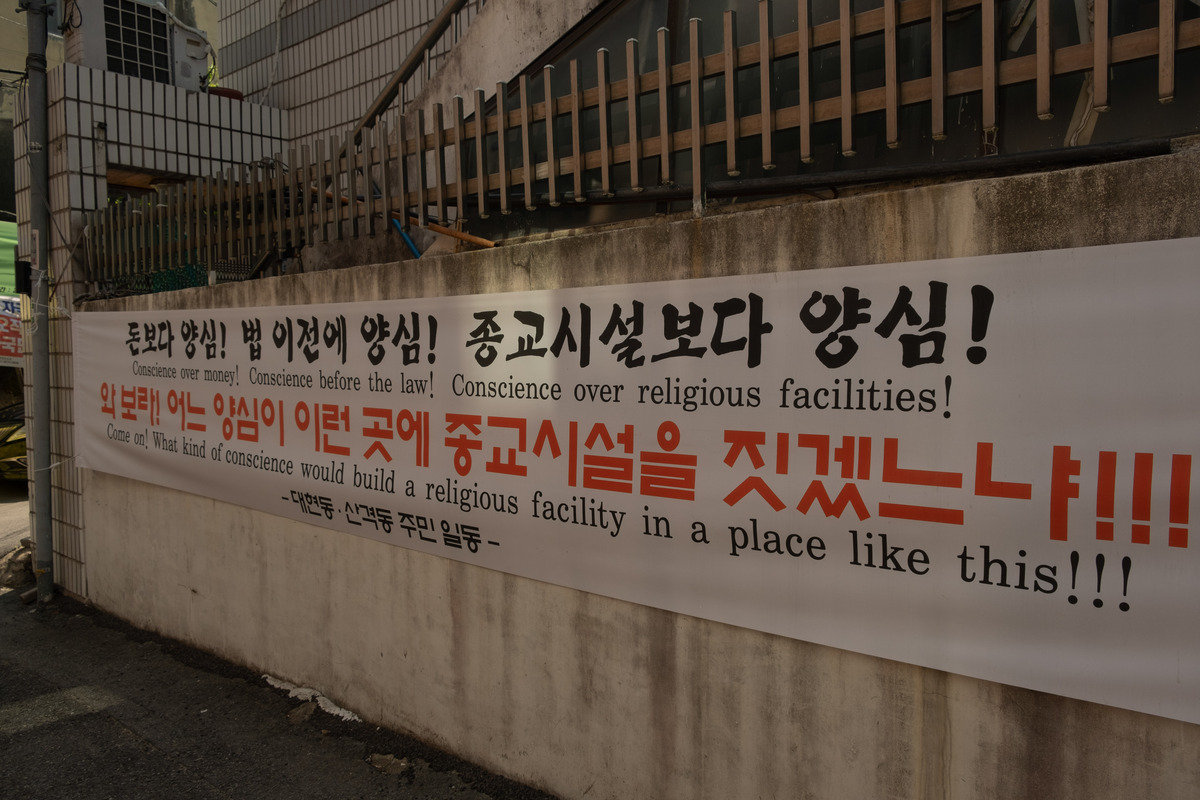
A banner awaited the alley throughout from the Dar ul Emaan Kyungpook Islamic Center.
Anthony Kuhn/NPR.
Last October, a severed pig head appeared in front of the website for the very first time. Razaq states he thinks a next-door neighbor of the website put it there. “That was a really frustrating minute for our entire neighborhood,” he informs NPR.
A regional homeowners’ committee likewise hosted a pork barbecue celebration close by.
Muslims are not permitted to consume pork under Islamic law. And individuals have actually utilized pork and severed pig heads as signs of anti-Muslim hate in other parts of the world, consisting of in the United States
Kim Jeong-ae, the deputy chair of the locals’ committee, argues the barbecue was a camaraderie-building event for locals in front of their homes, not an act of hate targeting the Muslim neighborhood or the mosque.
Kim states the problem is not what the structure is, however where. “We are opposed to a public center being integrated in the middle of a property district without any public roadway. We would have challenged anything,” she states.
Homeowners state they had actually tolerated sound, cooking smells and crowding of the narrow street, and now fear that the hassles will just grow with the mosque.
” Media reports state the locals are opposing Islam as a religious beliefs, however we do not actually understand about Islam,” states the resident Kim. “We are not interested.”
On the other hand, Muslim trainees and their member of the family who go to a momentary prayer hall right beside the building website see the pig heads each time they come. Kim firmly insists the display screen is done by a specific citizen and has absolutely nothing to do with the committee.
Kim Ji-rim, an attorney who represents the Muslim neighborhood here, states the South Korean legal system does not have a law versus hate speech and is not able to evaluate that the pig heads are targeting Muslims or make up a punishable offense.
When the trainees asked the cops and the district workplace to get rid of the pig heads, the authorities reacted there’s absolutely nothing they might do under the present law, Kim states.
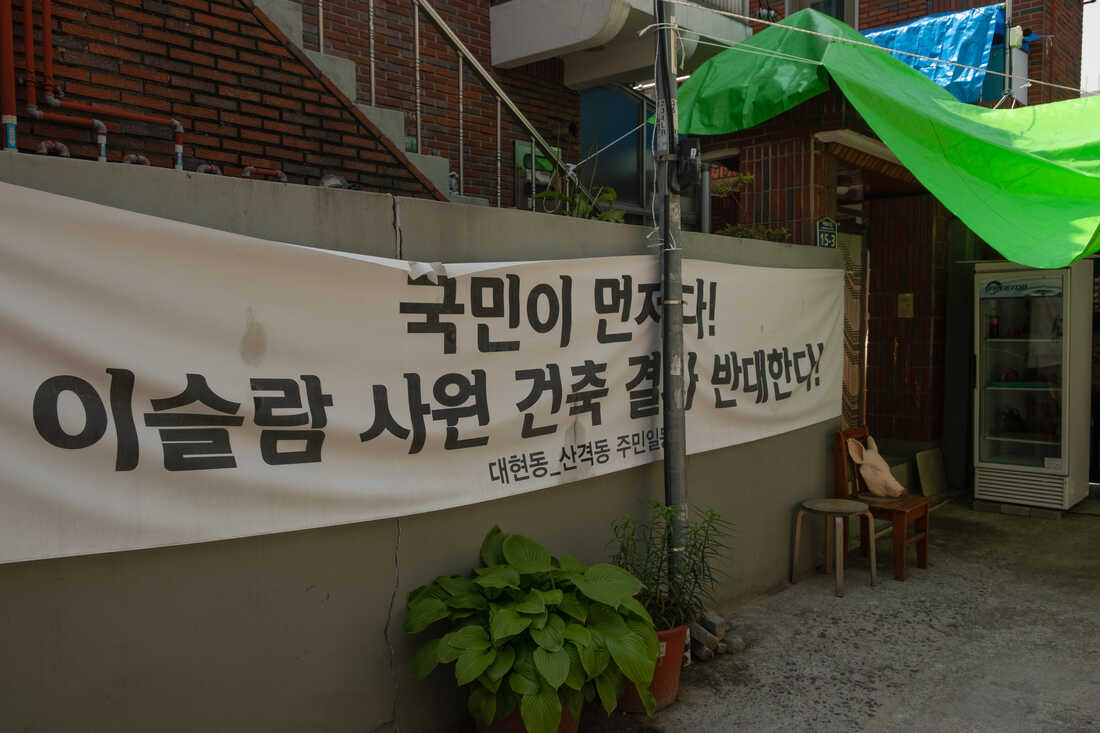
A banner awaited the alley opposes the mosque’s building, and states that Korean residents’ interests need to be preceded. At right, a reproduction pig’s head rests on a chair, and beside it, a couple of feet from the Islamic center sits a fridge with 3 pig heads in it.
Anthony Kuhn/NPR.
conceal caption
toggle caption
Anthony Kuhn/NPR.
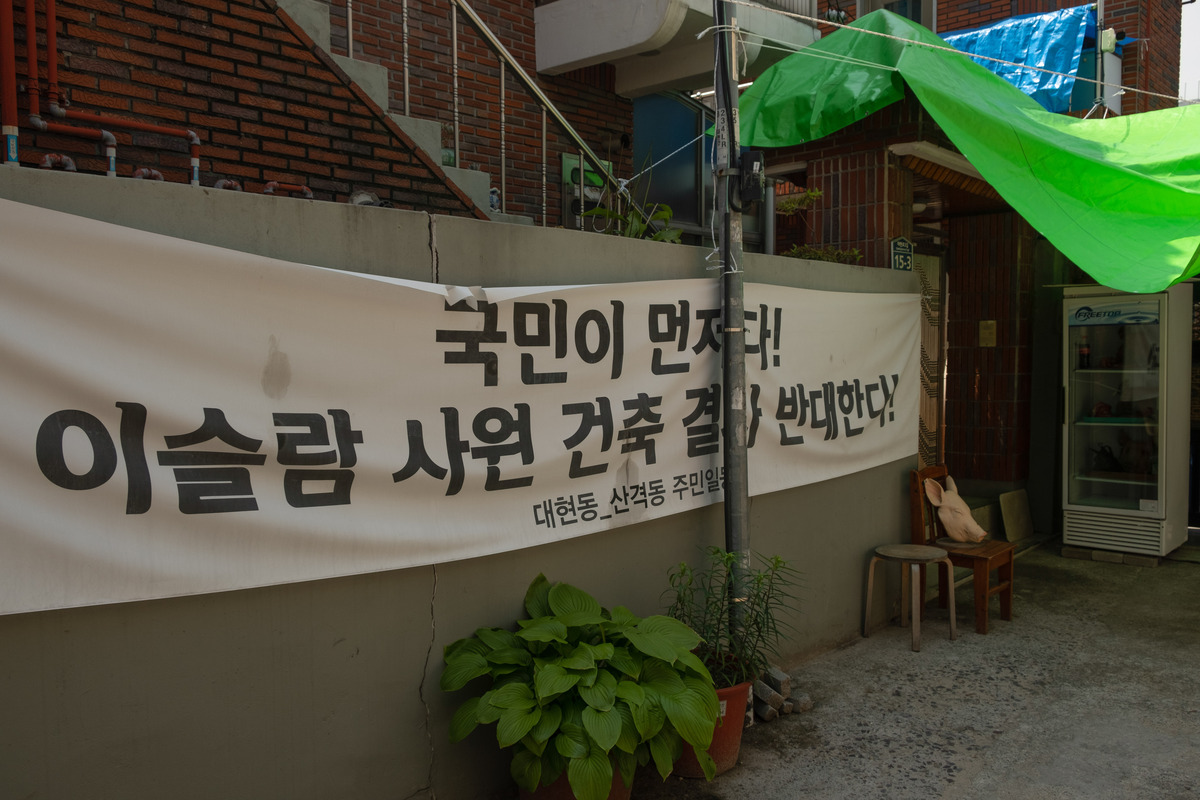
A banner awaited the alley opposes the mosque’s building, and states that Korean residents’ interests need to be preceded. At right, a reproduction pig’s head rests on a chair, and beside it, a couple of feet from the Islamic center sits a fridge with 3 pig heads in it.
Anthony Kuhn/NPR.
The district workplace of Buk-gu, Daegu, informed NPR it can not deal with the pig heads, which it considers personal ownerships put on personal property. The regional cops validated there is no law penalizing hate speech or clear standards on how to manage imitate this.
The National Person Rights Commission of Korea, a federal government company, stated in March that putting pork in front of a mosque under building to deteriorate Muslims does total up to dislike speech and “ought to not be endured.”
The commission can examine rights infractions versus social minorities, however its intervention is restricted to making suggestions to pertinent authorities.
In the meantime, the legal representative Kim states, the trainees sent a petition to the United Nations unique rapporteurs on migrant rights and civil liberty reporting the concerns and are awaiting their verification that the locals’ actions are prejudiced.
Considering That 2007, South Korea has actually made numerous efforts to enact laws a detailed law that forbids discrimination based upon gender, sexual preference, race, religious beliefs, special needs, age and other elements. To the present parliament alone, 4 different costs of this kind have actually been officially proposed.
All previous efforts have actually been not successful, due to strong and orderly opposition led by conservative Protestant churches. Christianity has the biggest spiritual following in South Korea, with 20% recognizing as Protestant in a 2022 study by Hankook Research Study.
Razaq states conservative evangelical groups’ participation in this problem– holding rallies, releasing declarations and taking part in mediation conferences– has actually heightened stress and hindered discussion with locals.
KNU sociology teacher Yi Sohoon, nevertheless, states South Korea can and need to control despiteful actions as a state celebration of the International Convention on the Removal of All Kinds of Racial Discrimination
However “there isn’t anybody executing it, so responsibility and enforcement is a problem here,” states Yi.
” The tolerance for hate under the existing legal structure stands out, which is even more factor for there to be a normative standard to set a minimum basic and set the bar to inform individuals why specific actions are incorrect,” she states, requiring anti-discrimination legislation.
More foreign trainees pertain to South Korea
The Muslim neighborhood at KNU is one part of a fast-growing group of immigrants in South Korea– worldwide trainees.
According to Justice Ministry information, the variety of foreign nationwide trainees registered in Korean institution of higher learnings went beyond 200,000 this year, compared to around 11,000 in 2001, when the federal government launched a strategy to hire more worldwide trainees.
Schools and the federal government are actively attempting to bring in more worldwide trainees, to handle the decreasing variety of college-age Korean trainees. South Korea’s overall fertility rate was up to 0.78 in 2015, the most affordable level amongst sophisticated economies.
Schools further away from the capital, Seoul, are particularly susceptible to a diminishing swimming pool of prospective trainees. Numerous schools have actually currently closed, dealing a blow to the regional economy.
In Daegu, the nation’s 4th most populated city, KNU saw its variety of worldwide trainees leap from a single digit in 1999 to over 1,100 in 2015. After China and Vietnam, Muslim-majority nations like Pakistan, Uzbekistan and Bangladesh send out the most trainees, according to the school’s 2022 publication
In the very same duration, the overall variety of immigrants remaining in South Korea grew from 381,116 in 1999 to 2,245,912 in 2015, according to the Justice Ministry.
Sociologist Yi, who likewise heads a job force for tranquil resolution of the mosque problem, states worldwide trainees like the Muslim trainees are “an important existence” for the South Korean federal government.
” The Muslim trainees here are really closer to a group that South Korean federal government typically desires, you understand, informed, premium migrants with education qualifications that South Koreans comprehend,” Yi states.
” However they feature something that South Korean society isn’t utilized to, which is what they call– what they believe is– a foreign religious beliefs.”
In the nation of simply under 52 million individuals, the Korea Muslim Federation approximates that in between 150,000 and 200,000 Muslims live in South Korea, consisting of 35,000 Korean Muslims.

Muslims at afternoon prayers at the Dar ul Emaan Islamic Center in Daegu, South Korea. The center was developed in 2014, however Muslims, the majority of whom study at a close-by university, have actually been attempting to build a mosque on the website because 2020.
Anthony Kuhn/NPR.
conceal caption
toggle caption
Anthony Kuhn/NPR.
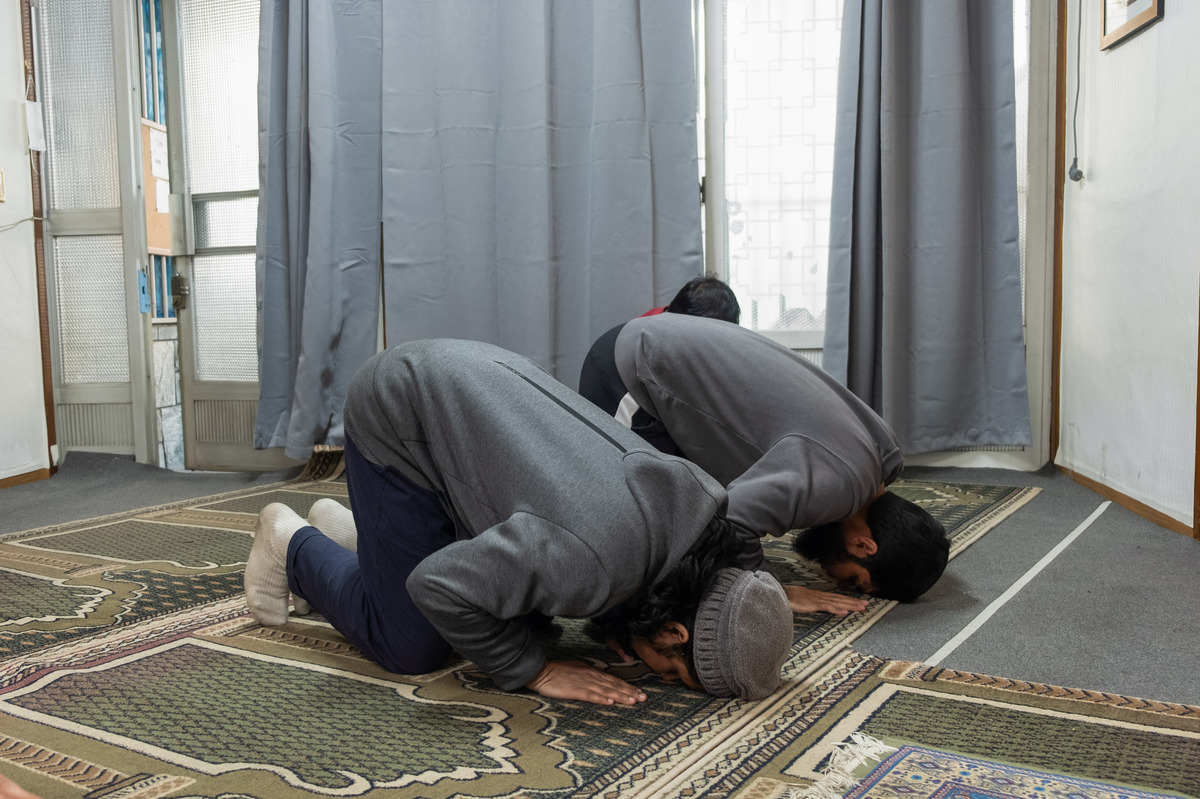
Muslims at afternoon prayers at the Dar ul Emaan Islamic Center in Daegu, South Korea. The center was developed in 2014, however Muslims, the majority of whom study at a close-by university, have actually been attempting to build a mosque on the website because 2020.
Anthony Kuhn/NPR.
The Justice Ministry, under the present federal government of President Yoon Suk Yeol, is pressing to upgrade the nation’s migration policy and introduce a brand-new migration company, with the objective of increasing the working-age population.
The ministry has actually currently increased the variety of seasonal migrant employees and opened a brand-new unique visa track for areas with significantly decreased populations. It is likewise thinking about a strategy to broaden the quota for competent employees who can remain in the nation longer.
However the scenario in Daegu reveals that while South Korea thinks about migration as a possible service for its population crisis, the nation is inadequately prepared to deal with migrants.
Migration policies for significant migrant groups, such as marital relationship migrants and low-skilled workers, have actually concentrated on assimilation and guideline.
In the lack of laws and policies dealing with the nation’s growing multicultural truth, both the Muslim trainees and opposing locals suffer an absence of federal government intervention in their dispute.
Previously this month, President Yoon participated in a conference of an unique committee on immigrants and required policies for their social status and rights.
” It appears that our society has actually prevented having genuine conversations on this problem,” he stated. “In spite of the growing variety of immigrants, our social understandings have actually not altered.”
NPR’s Anthony Kuhn added to this story from Daegu, South Korea.
